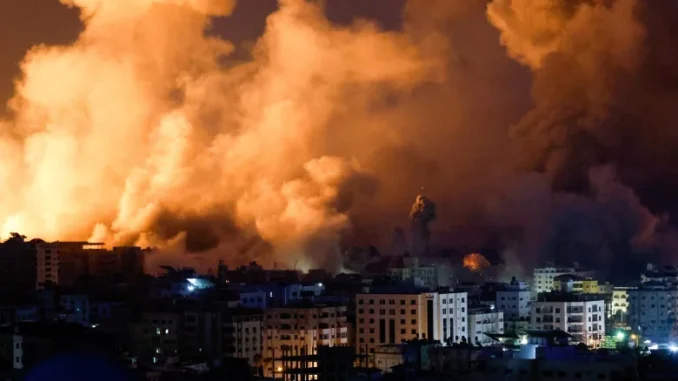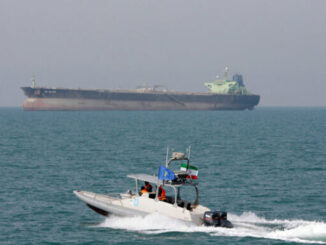
The war between Israel and Hamas poses a whole new series of risks to an already fragile global economy, and economists are warning it could take some time for the fallout to be clear.
“The global economy is limping along, not sprinting,” said International Monetary Fund chief economist Pierre-Olivier Gourinchas said at a joint meeting of the IMF and the World Bank in Morocco this week.
The annual meeting and its forecasts were all overshadowed by the crisis unfolding in southern Israel and Gaza.
- What questions do you have about the conflict? Send an email to ask@cbc.ca.
“It’s a humanitarian tragedy and it’s an economic shock we don’t need,” World Bank President Ajay Banga told Reuters.
Hamas militants swept across the border into Israel this weekend unleashing an unprecedented wave of attacks on villages near the Gaza border. More than 1,000 Israelis were killed, and more than 100 were dragged back into captivity in Gaza. Israeli warplanes have responded with days of airstrikes. Palestinian authorities say at least 900 people have been killed in Israeli airstrikes, and at least 4,500 have been wounded.
As the world watched those events in horror, the price of oil jumped by as much as five dollars per barrel, futures markets fell and the Israeli currency, the shekel, sunk to a seven-year low.
Since then, market reaction has been relatively subdued. But most experts believe that’s because no one really knows what will happen in the days ahead.
“Anything in the Middle East has always been high-risk of spreading,” said Paul Samson, the president of the Centre for International Governance Innovation in Waterloo, Ont.
Risk of conflict widening
On Monday, Israeli Prime Minister Benjamin Netanyahu said Hamas had made a mistake “of historic proportions.”
“We will exact a price that will be remembered by them and Israel’s other enemies for decades to come,” he said in a prepared statement.
Israel has called up 300,000 reservists and mobilized tanks along the border. The U.S. is moving an aircraft carrier strike group into the region as a show of support for its ally Israel.
- Humanitarian groups plea for safe corridors out of Gaza as supplies of food, fuel and medicine blocked
Experts say all that raises the stakes that the conflict could widen.
“If this expands and brings in other parties, then the outlook is for even a weaker global economy, even more inflationary pressures. And the markets are going to be finding it hard to deal with that,” renowned economist Mohamed El-Erian told the financial news channel CNBC.
Right now, oil traders seem to be watching along with the rest of the world unsure of what comes next.
Rory Johnston, the founder and publisher of the newsletter Commodity Context, says the conflict has a very real risk of drawing in two of the region’s biggest oil suppliers: Saudi Arabia and Iran.
“Everyone knows that Iran supports Hamas,” said Johnston. “What we don’t know is the extent of culpability in the explicit planning and green-lighting of this attack.”
Iran’s top authority, Ayatollah Ali Khamenei, denied any involvement, but heralded the attack as a success.
Meanwhile, Saudi Arabia was nearing completion of what would have been a historic peace and trade deal with Israel. That came after Israel signed trade agreements with Bahrain and the United Arab Emirates in 2020.
- Why Hamas took so many people hostage — and how that complicates Israel’s response
- Why the Hamas surprise attack on Israel is such a significant strike
Johnston says the Saudi deal reportedly involved boosting oil production, which would cut the cost of gasoline for global consumers. But now, he says, it’s unclear what will happen with the Saudi deal adding yet another layer of complexity to the oil market’s reaction.
“So, we have the two countries [Iran and Saudi Arabia] that have had the most variable oil production over the past year are now explicitly being implicated and pulled into the conflict and how it evolves from here,” he said.
What this could mean for inflation
The price of oil is directly related to the cost-of-living crisis throughout the Western world. If crude oil prices rise, that means consumers pay more at the pumps.

“We were hoping inflation was going down,” said Mark Manger, a professor of political economy at the Munk School of Global Affairs & Public Policy.
Beyond the price of oil, he says the price of bonds has ticked up since the weekend as investors seek out safe havens like U.S. treasuries and German bonds.
And, he says uncertainty and war weigh heavily on global trade as people quickly try to avoid risk.
“Fair to say, all of this is inflationary,” he said.
Samson says consumers, investors and policymakers alike need to brace for the very real chance that however this plays out, it will take a long time to resolve.
“I can’t imagine that the dust is settled within a year,” he told CBC News. “That doesn’t mean a conflict going on, but you know, there is a lot of dust to settle here.”



